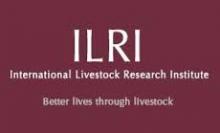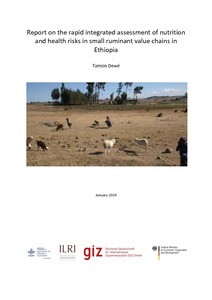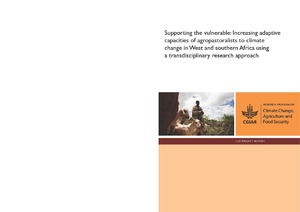Location
Vision, mission and strategy
ILRI's strategy 2013-2022 was approved in December 2012. It emerged from a wide processof consultation and engagement.
ILRI envisions... a world where all people have access to enough food and livelihood options to fulfil their potential.
ILRI’s mission is... to improve food and nutritional security and to reduce poverty in developing countries through research for efficient, safe and sustainable use of livestock—ensuring better lives through livestock.
ILRI’s three strategic objectives are:
- with partners, to develop, test, adapt and promote science-based practices that—being sustainable and scalable—achieve better lives through livestock.
- with partners,to provide compelling scientific evidence in ways that persuade decision-makers—from farms to boardrooms and parliaments—that smarter policies and bigger livestock investments can deliver significant socio-economic, health and environmental dividends to both poor nations and households.
- with partners,to increase capacity among ILRI’s key stakeholders to make better use of livestock science and investments for better lives through livestock.
This is ILRI’s second ten-year strategy. It incorporates a number of changes, many based on learning from the previous strategy (2000–2010, initially produced in 2000 and modified in 2002), an interim strategy (2011–2012) and an assessment of the external and internal environments in which the institute operates.
Members:
Resources
Displaying 341 - 345 of 1152Plotting progress: integrated planning in the rangelands of Kenya, Ethiopia, and Uganda
Ill advised, uncoordinated, and badly planned interventions have been blamed for continuing poverty and food insecurity in rangelands. Water interventions in particular have had negative impacts. Not only have these interventions failed to improve the livelihoods of people living there, but in many cases they have served to undermine them and the environment on which they depend. Rangeland development interventions have been sectoral in their approach.
Report on the rapid integrated assessment of nutrition and health risks in small ruminant value chains in Ethiopia
Utilizing technology to improve market access and livelihood security among pastoralists in eastern Africa: A case for the indegenous sheep in Kenya
The Nile Basin Development Challenge: A component of the CGIAR Challenge Program on Water and Food
Supporting the vulnerable: Increasing adaptive capacities of agropastoralists to climate change in West and southern Africa using a transdisciplinary research approach
The world’s climate is changing rapidly and Africa will be severely affected by this, not only because of the effects on ecosystems but also because of the low adaptive capacity of communities due to poverty and lack of infrastructure, services, and appropriate policies to support adaptation strategies. A large share of Africa’s poor are dependent on livestock for some part of their livelihoods, most of these living in smallholder, rainfed mixed systems and pastoral systems, where livestock play a key role as assets providing multiple economic, social, and risk management functions.





